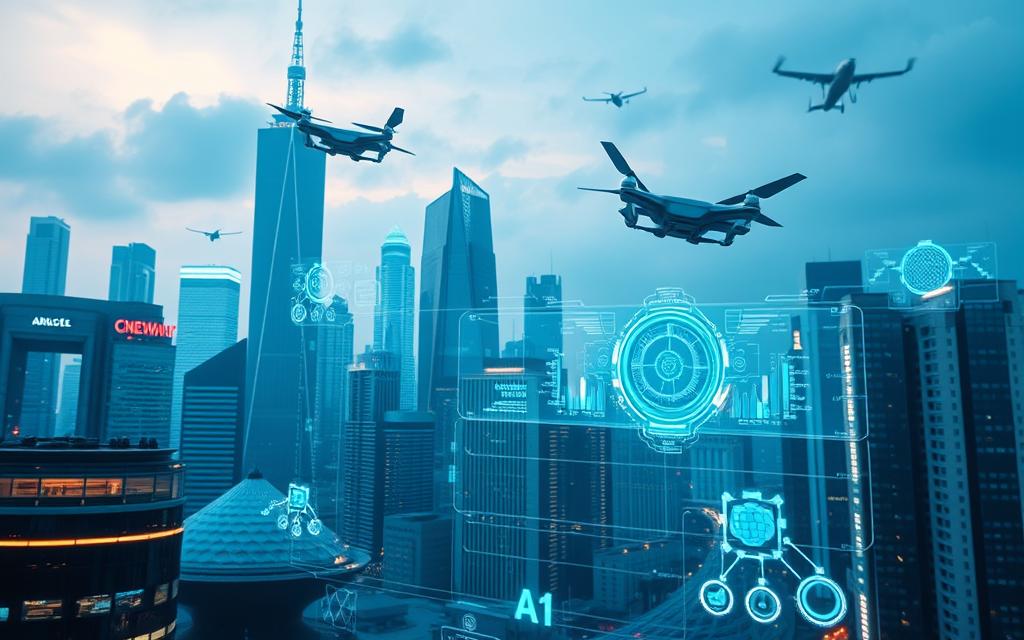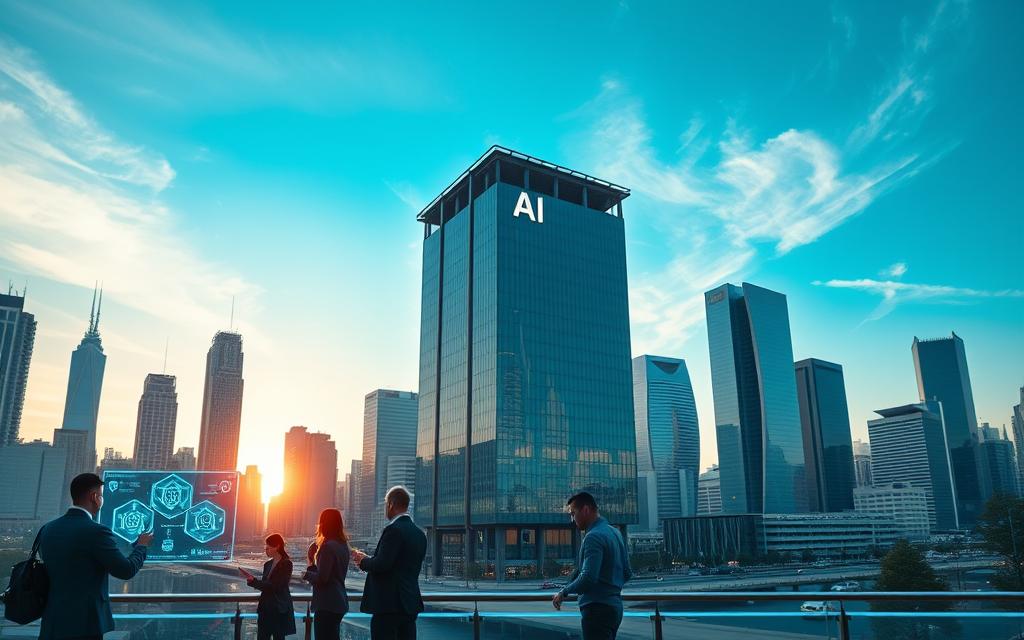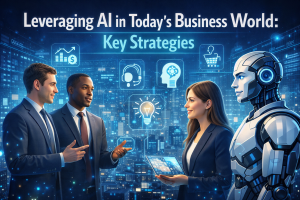Table of Contents
Artificial intelligence is reshaping industries by streamlining workflows and boosting efficiency. Companies leverage machine learning and automation to enhance productivity, saving millions annually. A telecom giant, for instance, cut costs by $80M using conversational AI.
Adoption rates confirm this shift. Over 82% of enterprises now integrate this technology, doubling since 2017. From customer service chatbots to predictive analytics, intelligent systems drive measurable results.
This guide explores ten real-world applications across departments. Discover how natural language processing refines marketing campaigns. Learn where robotic automation transforms financial forecasting. Each example demonstrates AI as a performance accelerator, not a workforce replacement.
The Transformative Power of AI in Modern Business
Decades of innovation have shaped artificial intelligence into a business powerhouse. What began as 1950s academic experiments now powers tools like ChatGPT, amassing 100M users by 2023. This evolution underscores AI’s role as a catalyst for enterprise growth.
Industries leverage these technologies uniquely. IBM’s watsonx Code Assistant accelerates developer workflows, while manufacturers use predictive maintenance to cut downtime by 30%. Automation isn’t just about efficiency—it’s a competitive edge.
Leading firms prove this. Société Générale’s AI-driven digital acceleration reduced processing times by 40%. Microsoft’s OpenAI partnership enhanced Azure’s cognitive services, enabling real-time language translation for global teams.
| Industry | AI Application | Impact |
|---|---|---|
| Finance | Fraud detection algorithms | Reduced false positives by 25% |
| Retail | Personalized recommendations | Boosted sales conversions by 18% |
| Healthcare | Diagnostic imaging analysis | Improved accuracy by 35% |
Hardware integration pushes boundaries further. Samsung’s Galaxy S24 embeds AI for live translation, proving technologies work best when seamlessly embedded. Meanwhile, MIT economists highlight AI’s potential to reduce inequality—if implemented strategically.
The future hinges on balancing opportunities with workforce readiness. As AI handles repetitive tasks, upskilling becomes critical. The goal? A symbiotic relationship between human creativity and machine precision.
Key Benefits of AI for Businesses
Forward-thinking enterprises gain measurable advantages through intelligent automation. These tools optimize workflows while deepening consumer relationships. Below are four critical areas where artificial intelligence drives impact.

Improved Customer Engagement and Experience
Chatbots and sentiment analysis tools respond instantly to inquiries. Unilever’s hyper-personalized campaigns increased click-through rates by 47%. Real-time adjustments keep messaging relevant.
Enhanced Data Analysis and Insights
Predictive models identify trends before they emerge. Retailers using AI-driven segmentation see 35% higher conversion rates. Granular insights inform inventory and staffing decisions.
Automation of Repetitive Tasks
Invoice processing and data entry now take minutes, not hours. One logistics firm reduced manual errors by 90% with robotic process automation. Employees focus on creative problem-solving.
Personalized Recommendations and Targeting
Dynamic pricing algorithms adjust offers based on demand. Programmatic advertising optimizes bids in milliseconds. Targeting precision cuts ad spend waste by up to 30%.
| Function | AI Application | Outcome |
|---|---|---|
| Marketing | Predictive customer segmentation | Higher conversion rates |
| Sales | Real-time pricing adjustments | Increased revenue per visitor |
| Support | Sentiment analysis | Faster complaint resolution |
Gartner predicts 30% of marketing content will be machine-generated by 2025. The key lies in balancing automation with human oversight for authentic connections.
How AI Can Be Used in Business: 10 Practical Applications
Companies across industries harness intelligent systems to solve critical challenges. These applications deliver measurable results, from boosting revenue to preventing costly errors.
Enhancing Customer Service with Intelligent Support
Chatbots handle 70% of routine inquiries, freeing human agents for complex issues. Zendesk reports AI-powered ticketing systems reduce resolution times by 40%. Real-time language translation breaks communication barriers in global support teams.
Revolutionizing Marketing Through Programmatic Strategies
Dynamic ad platforms analyze billions of data points to optimize campaigns. Salesforce Einstein increases click-through rates by 34% through hyper-personalized content. Budgets automatically shift to high-performing channels.
Delivering Tailored Product Suggestions
E-commerce giants like Amazon see 35% higher sales from recommendation engines. These systems track browsing patterns and purchase history to surface relevant items.
Preventing Equipment Failures Before They Occur
Manufacturers using predictive maintenance cut downtime by 30%. Sensors detect anomalies in vibration, temperature, and performance, scheduling repairs during planned outages.
Securing Financial Transactions with Advanced Detection
Banks leverage machine learning to identify fraudulent patterns. JPMorgan Chase reduced false positives by 25% while catching 15% more actual fraud cases annually.
Optimizing Supply Chains with Smart Forecasting
Retailers using AI-driven inventory management report 20% fewer stockouts. Algorithms account for weather, trends, and supplier delays to maintain ideal stock levels.
Boosting Sales Performance Through CRM Intelligence
AI-enhanced CRM tools prioritize high-value leads and suggest optimal contact times. Sales teams using these insights close 28% more deals.
Breaking Language Barriers with NLP Technology
Natural language processing enables real-time translation for global teams. Samsung’s live call translation feature supports 13 languages, fostering seamless international collaboration.
Streamlining Content Production at Scale
News outlets generate 30% of routine reports using automated writing tools. Human editors focus on investigative pieces while AI handles earnings summaries and sports recaps.
Understanding Customer Sentiment in Real Time
Sentiment analysis tools identify dissatisfaction trends weeks before churn occurs. One telecom provider retained 89% of at-risk customers through proactive interventions.
- Monitor social conversations across platforms
- Analyze support tickets for emerging issues
- Adjust product roadmaps based on feedback patterns
Sprout Social’s AI detects market shifts two weeks faster than traditional methods. This early warning system helps brands adapt messaging before trends peak.
Challenges and Ethical Considerations of AI in Business
Businesses face complex hurdles when implementing intelligent solutions. While 73% of U.S. firms use these tools, only 10% of small companies understand deployment. Ethical risks and technical barriers demand careful navigation.

Ethical and Privacy Concerns
Protecting consumer data remains critical. AI systems handling sensitive information attract cyberattacks—85% of security leaders report AI-driven phishing attempts. Proactive training reduces threats by 86% within a year.
Transparency gaps also arise. Algorithms may unintentionally bias decisions, raising fairness questions. Companies must audit models regularly, as highlighted in ethical considerations of AI research.
Workforce Transformation and Skill Gaps
Automation could displace 85 million jobs by 2025. Yet 97 million new roles will emerge, requiring advanced technical skills. Upskilling programs bridge this divide.
Hybrid teams thrive when humans oversee AI outputs. For example, IBM’s AIOps trains staff to manage IT systems, blending machine speed with human judgment.
Integration and Compatibility Issues
Legacy technologies hinder scaling. API-first strategies ease integration, while hybrid cloud infrastructures support deployment. Modernization cuts downtime by 30% in manufacturing.
| Challenge | Solution | Outcome |
|---|---|---|
| Data Privacy | Encryption + Access Controls | Reduced breach risks |
| Skill Gaps | Upskilling Initiatives | Higher retention rates |
| System Compatibility | Modular Upgrades | Faster implementation |
Balancing innovation with responsibility ensures sustainable growth. Firms that address these challenges early gain long-term trust and efficiency.
Future Trends in AI for Business
Emerging technologies are reshaping enterprise strategies at unprecedented speed. Over 60% of jobs in advanced economies may integrate augmented tools by 2025, blending machine efficiency with human creativity. This shift demands agile adaptation across sectors.

The Rise of Agentic AI
Autonomous systems now handle multi-step workflows without constant oversight. Deloitte’s AI-assisted audit tools analyze thousands of transactions in minutes, reducing errors by 40%. These self-directed platforms learn from each interaction, improving accuracy over time.
Collaboration Between Governments and Businesses
Public-private partnerships drive responsible innovation. Joint initiatives fund reskilling programs, preparing the workforce for hybrid roles. Policies ensure ethical deployment while fostering competition.
AI-Augmented Workforce
Intelligent tools amplify human potential. Key applications include:
- GitHub Copilot suggesting code snippets to developers
- Diagnostic AI supporting radiologists with 98% accuracy
- Adaptive learning platforms personalizing employee training
| Industry | Augmentation Tool | Productivity Gain |
|---|---|---|
| Software Development | AI pair programming | 55% faster debugging |
| Healthcare | Diagnostic support | 30% fewer misdiagnoses |
| Education | Personalized tutoring | 22% higher retention |
Strategic integration ensures humans remain central to decision-making. The future belongs to teams that harness these synergies.
Conclusion
The business landscape evolves rapidly with intelligent technologies. PwC projects a $15.7 trillion global economic impact by 2030, while 94% of firms already see measurable ROI, per McKinsey.
Success demands a strategic roadmap. Prioritize efficiency gains through phased integration, from chatbots to predictive analytics. Continuous ethics reviews ensure responsible scaling.
Upskilling teams remains critical. Hybrid roles blending human creativity with machine productivity will define the future. Start assessments now to identify high-impact AI opportunities.
FAQ
What are the main benefits of artificial intelligence for businesses?
A: Artificial intelligence enhances customer engagement, automates repetitive tasks, and provides deep data analysis. It also enables personalized recommendations and improves operational efficiency.
How does AI improve customer service?
A: Chatbots and natural language processing tools handle inquiries instantly, reducing wait times. AI also analyzes customer behavior to offer tailored support.
Can AI optimize supply chain management?
Yes. Machine learning predicts demand, tracks inventory, and identifies inefficiencies. This leads to cost savings and smoother supply chain operations.
What industries benefit most from AI applications?
Finance, retail, healthcare, and manufacturing gain from fraud detection, predictive maintenance, and personalized marketing. AI also transforms logistics and customer service.
What ethical concerns surround AI in business?
Issues include privacy, bias in algorithms, and job displacement. Companies must ensure transparency and comply with regulations.
How does AI enhance marketing strategies?
A: Programmatic advertising and sentiment analysis refine campaigns. AI also generates personalized recommendations based on user data.
Will AI replace human workers?
AI augments rather than replaces jobs. It handles repetitive tasks, allowing humans to focus on creativity and strategy. Upskilling is key for workforce adaptation.
What role does big data play in AI-driven businesses?
A: Big data fuels AI by providing insights into trends and customer behavior. This helps companies make informed decisions and improve products.
What future trends will shape AI in business?
A: Agentic AI, stronger human-AI collaboration, and government partnerships will drive innovation. Expect advancements in automation and machine learning.









